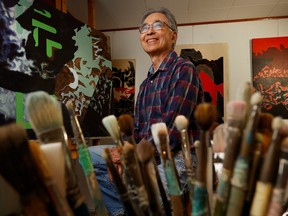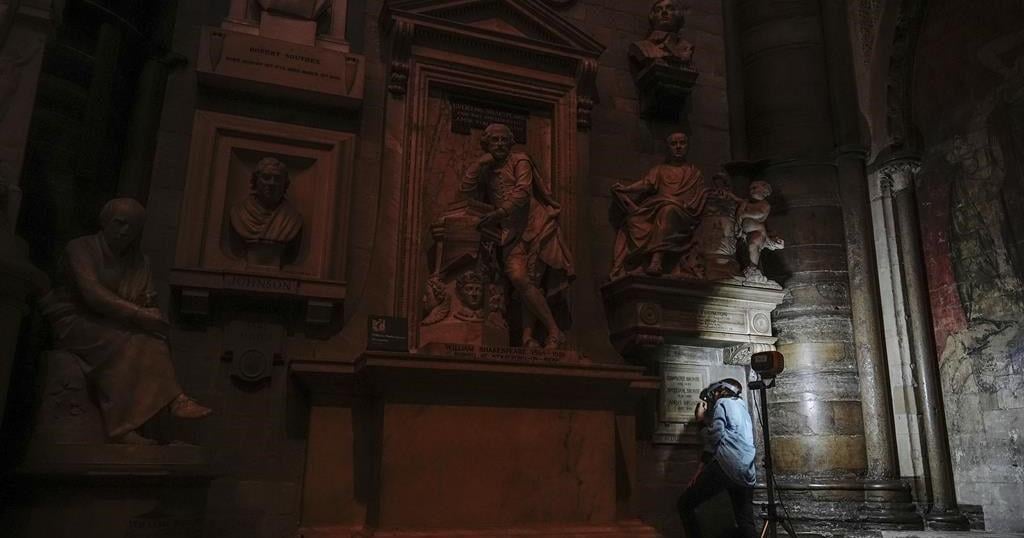Our Summer Spotlight series highlights some Ottawa residents who strive to build a better community. Today, Brigitte Pellerin speaks with Norman Takeuchi.
Art
Q & A: Ottawa’s Norman Takeuchi on how art can bring people together
Recently named to the Order of Canada, the much-admired painter also shares some sober thoughts about how this country has treated Japanese Canadians.

Q. Tell us a little bit about you. How did you come to be in Ottawa? And what’s keeping you here?
When I graduated from the Vancouver School of Art, I got a job in the advertising industry for a little while. And then I got an arts grant, which made me decide to go to London, England, to paint for a year. That was 1962.
When it was time for me to come back home, I needed to find a job. I got in touch with my former employer who said that there was nothing going on in Vancouver, why not try Ottawa because they were looking for designers to work on the Canadian Pavilion at Expo 67 in Montreal. I got that job as one of the exhibition designers for the pavilion. I never went back to Vancouver. It was one of the best things I ever did.
Q. You were recently appointed to the Order of Canada for your “enduring commitment to honouring, preserving and sharing the history and heritage of Japanese Canadians.” Tell us a little bit more about that history and heritage?
I think that people should know more about the history of what happened to Japanese-Canadians during the Second World War, when Canada went to war against Japan.
Nevertheless, the government invoked the War Measures Act, which gave them the right to uproot Japanese people on the West Coast and send them off to internment camps. And label them as enemy aliens which was, of course, a huge demeaning blow to the Japanese people. They sent off 22,000 Japanese people to internment camps and they weren’t allowed to come back to the West Coast until a few years after the war ended. It’s a very grim and dark chapter in our history that not many people know.
Q. Many people in our society today think that art is something of a luxury. First, you need to make sure your basic needs are covered: shelter, food, clothing and so on. Should we consider the arts a basic human need just like shelter, food and clothing?
Artists create different kinds of worlds that can only come out of a creative mind. And in doing that, I think that they can add so much more to the lives of people, so much beauty and meaning.
Q. Especially in a time when there’s a lot of political division, the arts can help bring people together — would you agree with that?
Yes, that’s a very good point. And I think it also makes people understand each other a little bit more, and by doing that, by understanding each other, there should be harmony between different groups, which seems to be lacking at this time.
Q. What do you think we in Ottawa could do to help young artists, especially young artists from minority communities, do well here?
One of the things is more public places to show their art or to perform their art. Ottawa has some, but I think there’s always room for more public support. Young people bring with them new ways of seeing and expressing themselves and we need to pay attention to that.
I wish I had taken more chances with some of the choices that I made in my career. One of the most important things that an artist can do in order to advance their career and their ability to produce as an artist is to take chances and take risks, despite the possibility of failure. It’s the only way to find something new to say and in the process find your own identity as an artist.
Q. You have the attention of everyone in Ottawa for one minute. What do you say?
I would say, pay more attention to the arts, go to the performances, go to the galleries, read books, and listen to music. And generally enhance your life and learn. Enhance your life by bringing the kind of beauty that the arts bring, and bring it into your life. Make your life more enjoyable, and more meaningful.
Q. When you’re trying to relax, what do you do for fun?
I listen to music and read when I get a chance. I like to read fiction. And gardening is probably the one thing that helps me the most. In the wintertime, I love to curl.
(This Q and A has been lightly edited.)
**
Do you know an Ottawa resident doing good work who should get some recognition? You can make a suggestion for our “Summer Spotlight” series by emailing our letters editor, at letters@ottawacitizen.com
Art
40 Random Bits of Trivia About Artists and the Artsy Art That They Articulate – Cracked.com
[unable to retrieve full-text content]
40 Random Bits of Trivia About Artists and the Artsy Art That They Articulate Cracked.com

Source link
Art
John Little, whose paintings showed the raw side of Montreal, dies at 96 – CBC.ca
[unable to retrieve full-text content]
John Little, whose paintings showed the raw side of Montreal, dies at 96 CBC.ca

Source link
Art
A misspelled memorial to the Brontë sisters gets its dots back at last

LONDON (AP) — With a few daubs of a paintbrush, the Brontë sisters have got their dots back.
More than eight decades after it was installed, a memorial to the three 19th-century sibling novelists in London’s Westminster Abbey was amended Thursday to restore the diaereses – the two dots over the e in their surname.
The dots — which indicate that the name is pronounced “brontay” rather than “bront” — were omitted when the stone tablet commemorating Charlotte, Emily and Anne was erected in the abbey’s Poets’ Corner in October 1939, just after the outbreak of World War II.
They were restored after Brontë historian Sharon Wright, editor of the Brontë Society Gazette, raised the issue with Dean of Westminster David Hoyle. The abbey asked its stonemason to tap in the dots and its conservator to paint them.
“There’s no paper record for anyone complaining about this or mentioning this, so I just wanted to put it right, really,” Wright said. “These three Yorkshire women deserve their place here, but they also deserve to have their name spelled correctly.”
It’s believed the writers’ Irish father Patrick changed the spelling of his surname from Brunty or Prunty when he went to university in England.
Raised on the wild Yorkshire moors, all three sisters died before they were 40, leaving enduring novels including Charlotte’s “Jane Eyre,” Emily’s “Wuthering Heights” and Anne’s “The Tenant of Wildfell Hall.”
Rebecca Yorke, director of the Brontë Society, welcomed the restoration.
“As the Brontës and their work are loved and respected all over the world, it’s entirely appropriate that their name is spelled correctly on their memorial,” she said.
The Canadian Press. All rights reserved.
-

 News23 hours ago
News23 hours agoFreeland says she’s ready to deal with Trump |
-

 News23 hours ago
News23 hours agoNASA astronauts won’t say which one of them got sick after almost eight months in space
-

 News23 hours ago
News23 hours ago43 monkeys remain on the run from South Carolina lab. CEO thinks they’re having an adventure
-

 News24 hours ago
News24 hours agoFreeland rallies a united front ahead of Trump’s return to White House
-

 News24 hours ago
News24 hours agoDeputy minister appointed interim CEO of AIMCo after Alberta government fires board
-

 News24 hours ago
News24 hours agoMontreal says Quebec-Canada dispute stalling much-needed funding to help homeless
-

 News24 hours ago
News24 hours agoS&P/TSX composite index down Friday, Wall St. extends post-election gains
-

 News23 hours ago
News23 hours agoMitch Marner powers Matthews-less Maple Leafs over Red Wings





















